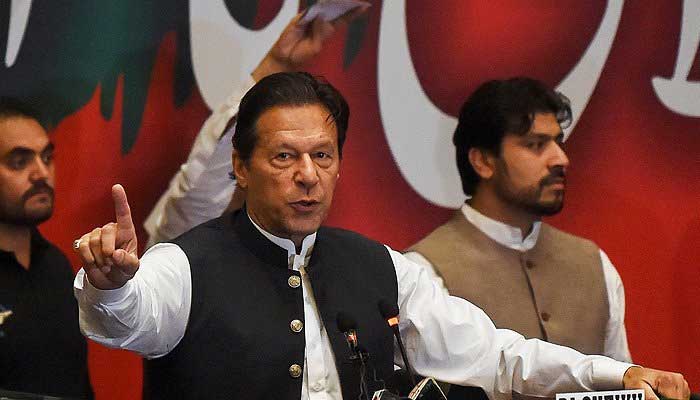Defeating populism
When Khan roars in jalsas that haqeeqi azadi is his ultimate political promise to people, he does not explain what that is and how Pakistan lacks it or how to achieve it
September 10, 2022

Former prime minister Imran Khan has said that the current government should not appoint the new army chief and has demanded that the appointment should be made on ‘merit’, without defining what he means by ‘merit’ in this case.
Just in making this statement, Khan, who has served as prime minister for nearly three years and eight months has chosen to disregard about a dozen constitutional and legal procedures and conventions in place. Has he chosen to simply ignore the constitutional procedure to appoint services chiefs and who is authorised to do so, or has he displayed a lack of basic knowledge on the subject? Since it is hard and in fact worrying to imagine that a former PM doesn’t know the constitutional process, did he choose to overlook it just to make a political point?
It is not the first time that he has chosen public meetings to discuss sensitive issues just for his political mileage. He uses religion at will and weaponises its use for petty, personal benefits. While he presents himself as a steadfast leader, he doesn’t hesitate to call political opponents thieves, corrupt and even traitors. His entire political strategy is based on feeding the public with fluff slogans and skin-deep notions. He does not focus on his own governance performance but his rival leaders are certified as incompetent.
These are all classic manifestations of a populist leader. The phenomenon of populism is simple yet complex. It is simplistic to equate the populist approach of a leader to his or her popularity. Despite the danger to democracy, the dictionary definition of populism appears benign as it is a type of politics that claims to represent the opinions and wishes of ordinary people.
Populism defines a political approach that projects itself to appeal to ordinary people who feel their concerns are disregarded by established political parties or groups. On the face of it, there’s nothing wrong with that approach. Every political party/leader enters the public sphere to offer an alternative solution to existing public issues and grievances with the right to disagree with other parties’ approach/ideologies. Trouble begins when populist leaders draw battle lines against political opponents as a fight between good and evil.
A populist leader does not offer a better governance model but uses existing public perception of injustice to further personal political ends. A populist uses existing public grievances by polarising society into followers who are right and virtuous people and opponents who are corrupt and evil. Add to this contest between virtue and an evil personal charisma and good communication skills and there is the perfect populist pied piper able to sway followers upon followers with empty promises.
Dissatisfaction with democracy, the state of an ever-worsening economy, and the presence of anti-US and anti-establishment sentiments in society combined with a view on the failure of tried and tested political parties in resolving governance issues offer plenty of space for a populist to use to their advantage here.
So when Khan roars in jalsas that haqeeqi azadi or real freedom is his ultimate political promise to people, he does not explain what that is and how Pakistan lacks it or how to achieve it. He does not even pause to add what he did about it during his time in office. When he says that his self-respecting nation is chained to borrowing from IFIs and can’t soar high, he is making people dream a dream that he doesn’t have to break down on how to realize.
It’s a bit convenient to fit in the reality of his own government approaching the IMF within this lofty narrative. When he accuses his political opponents of having sucked the blood out of the country due to corruption, his followers believe it despite the fact that the reality of the hybrid governance model imposed on the country for the most part is etched deeply in history. It is of course not in the populist leader’s interest to explain how he has benefited politically from that.
When he paints a picture of respect for the green passport globally, the horizon is beautifully lit but he does not draw the steps required overtime to acquire that. From hallowed promises to the stirring of religious sentiments, he is armed with all that he requires to use as irresponsibly as he likes. There is now a new Imran lexicon and it is in use indiscriminately to gain personal political advantage.
How then to tackle, contain and defeat populism which has become a growing threat to our democracy from within? Political scientists argue that the threat to democracies intensifies if populists are elected to power. Populists “drag democracies down to fit their authoritarian personalities and ambitions,” says American political sociologist Larry Diamond. They attack all forms of checks on democracy such as media, civil society, independence of courts, parliament and finally try to take “effective control of electoral administration” to ensure their re-election. A straightforward solution is ensuring the electoral defeat of a populist. This may appear simple enough but against a growing tide, what are the strategies required to do that?
While there is no one-size-fits-all approach possible, Pakistan is amongst many other global democracies that are facing a similar threat. Offering a list on how to defeat a populist based on the experience of various global democracies, Larry Diamond proposes basic dos and don’ts in confronting a populist: Don’t follow the populist’s strategy to ‘out-polarize’ and denounce him in return as it will be counter-productive and harden his support base and undecideds. An inclusive electoral strategy that appeals to interests and positive values of doubting elements of the populist’s support base, without questioning their morals or motives, might be useful.
Avoid getting down to the populist’s level by mimicking his/her style of name-calling opponents. Show humility, empathy, and even love to neutralize the populist’s poisonous politics of resentment and division. Delve deeper into voters’ grievances to do so. Develop a positive, issues-based, non-sensational campaign strategy focused on policy failings and vulnerabilities of populist administrations to offer substantive, practical, non-ideological policy proposals.
Democracy and nationalism are common belongings and should not be allowed to be hijacked by a populist. A credible and sincere approach to offer unifying pride in the country without trashing a foreign entity or government can focus on celebrating the country, people, culture, and accomplishments. Offer hope and an optimistic vision of a better future which is inclusive, forward-looking and hopeful and which goes beyond just a rational appeal to interests or a technocratic future of smart government.
His last and most interesting advice: don’t be boring and don’t ignore the stylistic element of electoral politics. Use the same dynamic information space used by populists to create shock and awe to find lively and creative ways to communicate messages of hope, inspiration, and concrete policy alternatives, with passion and conviction.
The writer is an analyst working in the field of politics, democratic governance, legislative development and rule of law.











